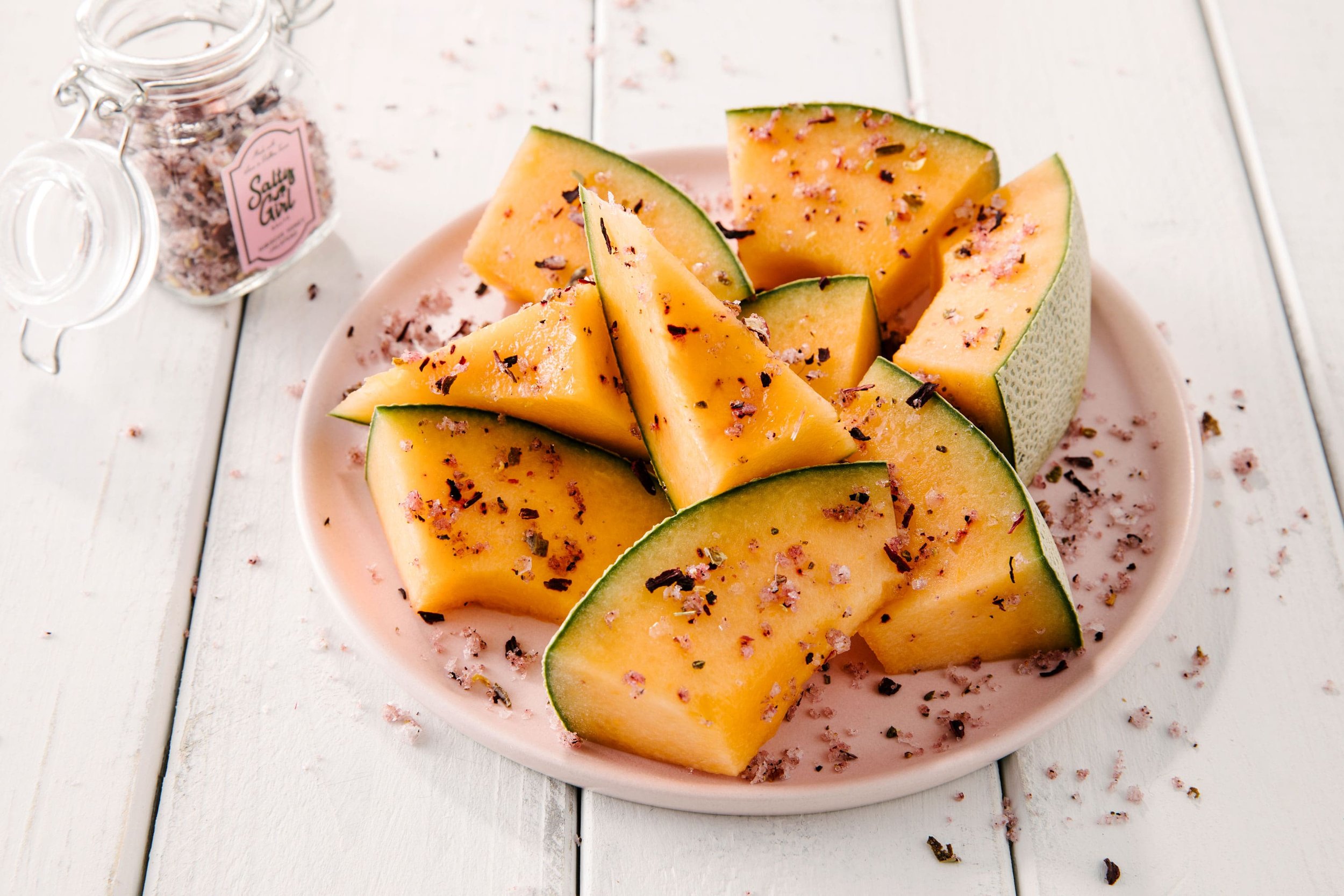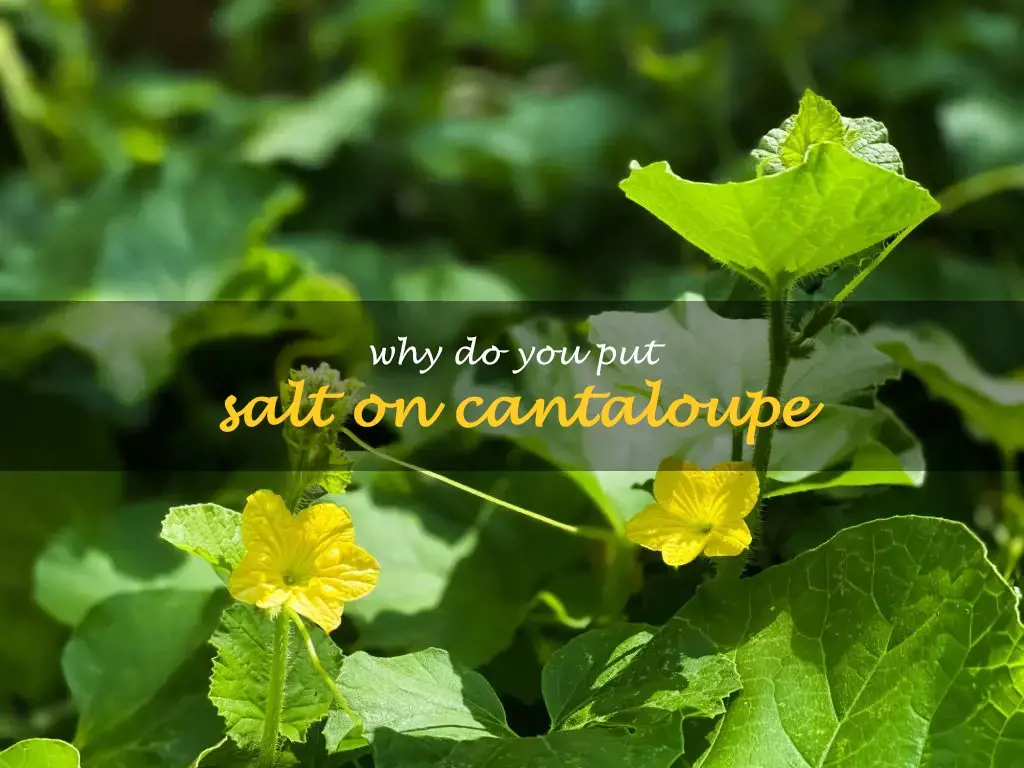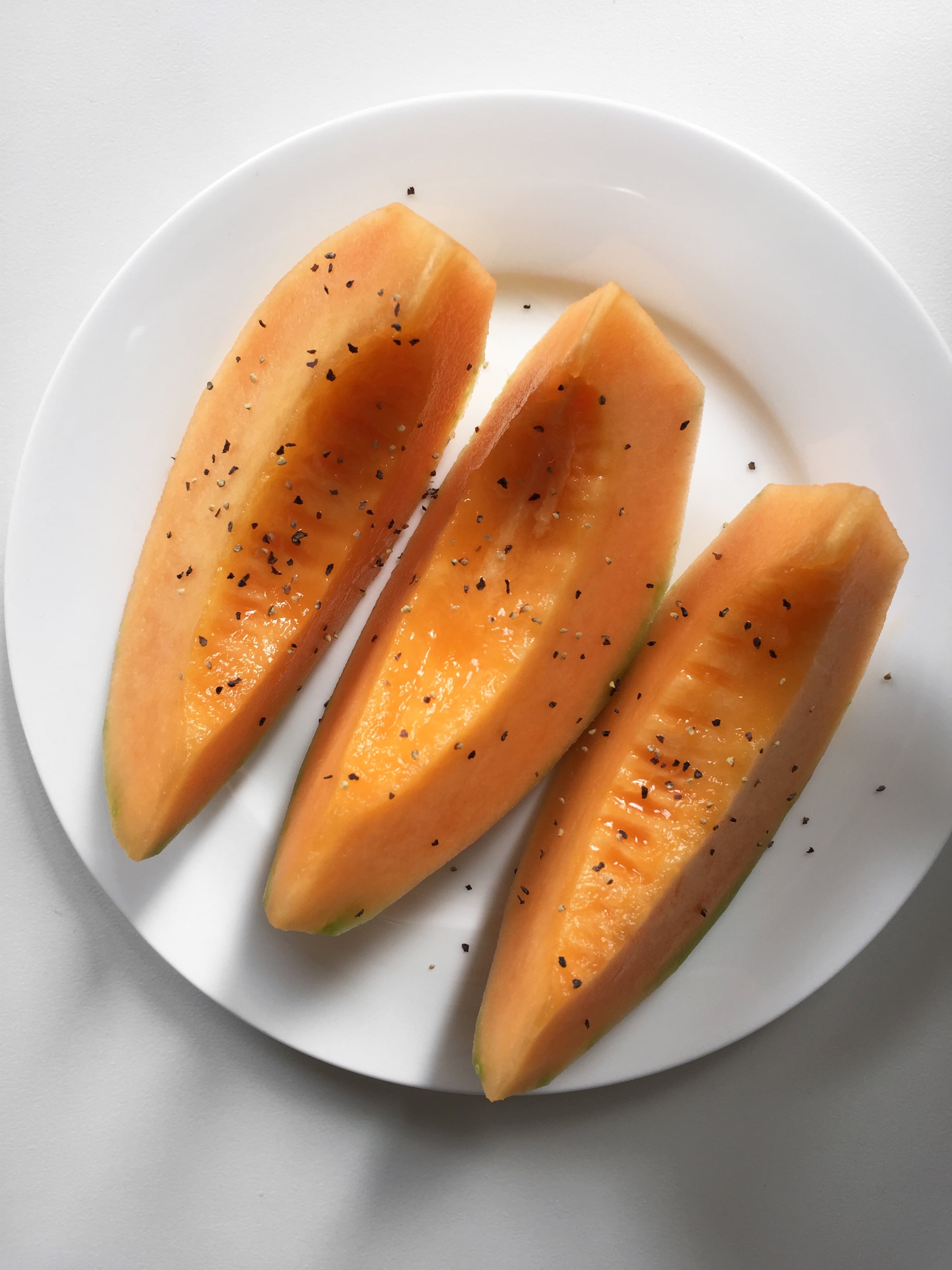The Secret Ingredient: Why Salt On Cantaloupe Transforms Your Summer Treat
Imagine biting into a perfectly ripe cantaloupe – that burst of juicy sweetness, the refreshing texture, the quintessential taste of summer. It's a culinary delight, a simple pleasure that many of us cherish. But what if I told you there's a surprisingly simple trick to elevate that experience, to make even the most magnificent melon sing louder, or to rescue a less-than-perfect one from mediocrity? This secret involves an everyday pantry staple, something you likely wouldn't associate with fruit: salt. Yes, a sprinkle of salt on cantaloupe can be a game-changer, unlocking deeper flavors and a more profound enjoyment from this beloved fruit.
For many, the idea of adding salt to fruit, especially something as inherently sweet as cantaloupe, might seem utterly counterintuitive. We're conditioned to think of salt as a companion to savory dishes, a seasoning for meats, vegetables, or perhaps a rim for a margarita glass. Yet, culinary wisdom, passed down through generations and increasingly supported by scientific understanding, reveals that salt is a natural flavor enhancer that transcends the savory realm. It's a master key that can unlock hidden dimensions in sweet foods, transforming the familiar into something truly extraordinary.
Table of Contents
- The Counterintuitive Magic of Salt on Cantaloupe
- Beyond Sweetness: How Salt Elevates Cantaloupe's Profile
- Rescuing Underripe Melons: A Pinch of Hope
- The Science Behind the Sprinkle: Why Salt and Fruit Harmonize
- Creative Culinary Pairings with Salted Cantaloupe
- Beyond Cantaloupe: The Salt Trick for Other Melons
- Important Considerations When Adding Salt to Cantaloupe
- Conclusion
The Counterintuitive Magic of Salt on Cantaloupe
Most people don't realize that one of the best ways to bring out the flavor in cantaloupe is to add a little salt. This statement often elicits a raised eyebrow, a look of disbelief, or even outright skepticism. After all, salt is usually associated with making things taste, well, salty. But that's precisely where the magic lies. That may sound counterintuitive, but salt is a natural flavor enhancer. It doesn't just add its own taste; it interacts with the existing flavors in the food, amplifying certain notes and suppressing others, creating a more balanced and profound sensory experience.
When it comes to fruit, particularly sweet varieties like cantaloupe, salt performs a remarkable feat: it cuts through any potential bitterness or flatness, allowing the fruit's inherent sweetness to shine through with greater intensity. Think of it like a spotlight on a stage; the salt clears away the distractions, making the star performer—the cantaloupe's natural sugars—even more dazzling. By cutting the bitterness, salt allows the true sweetness and juiciness of the cantaloupe to come forward. This isn't about making the cantaloupe taste salty; it's about making it taste more like itself, but better. It's a subtle art, where a mere pinch can transform the ordinary into the extraordinary, proving that sometimes, the most unexpected pairings yield the most delightful results.
Beyond Sweetness: How Salt Elevates Cantaloupe's Profile
The primary reason for adding salt to cantaloupe isn't just to make it taste sweeter, but to unlock a fuller, more complex flavor profile. Just a sprinkle of salt on cantaloupe will make the sweetness more pronounced and give the fruit a more complex taste. It's not about making the fruit salty; it's about creating a dynamic interplay between the sweet and savory notes that dance on your palate. This complexity is what elevates a simple slice of melon from merely refreshing to truly memorable. The salt acts as a counterpoint, preventing the sweetness from becoming cloying or one-dimensional, introducing a subtle depth that makes each bite more interesting.
Beyond flavor, salt also plays a surprising role in enhancing the fruit's texture. Salting watermelon also improves the fruit’s texture. As a result, each bite is guaranteed to be juicy. While the data specifically mentions watermelon, the principle applies to cantaloupe as well. Salt helps to draw out some of the fruit's internal moisture, concentrating the flavors and firming up the flesh slightly, leading to a more satisfying, juicy bite. This subtle change in texture can make a significant difference, especially with melons that might be slightly soft or watery. The experience is not just about taste, but also about the delightful sensation of a perfectly textured, incredibly juicy piece of fruit.
Rescuing Underripe Melons: A Pinch of Hope
We've all been there: the excitement of bringing home a beautiful cantaloupe, only to cut into it and find it disappointingly underripe, bland, or tasteless. My cantaloupe is under ripe, and tasteless. I'm so disappointed in them overall, this year. It's a common summer lament. But before you resign yourself to tossing that subpar melon or forcing yourself to eat it out of obligation, there's a simple, effective remedy. There’s actually a way to make a bad melon taste, well, better. And it’s all thanks to one ingredient. That ingredient, as you might have guessed, is salt.
Instead of tossing your subpar melon, try seasoning it with a pinch of trusty salt. While salt can't magically ripen a green melon, it can significantly improve the flavor of one that's simply lacking in sweetness or has a slightly bitter edge. By performing its flavor-enhancing magic, salt can draw out what little sweetness is present and neutralize any off-notes, making the fruit far more palatable and enjoyable. It's not a miracle cure for every melon mishap, but for those borderline cases, a light sprinkle of salt can transform a disappointing experience into a surprisingly pleasant one, saving your fruit and your summer snack plans.
The Science Behind the Sprinkle: Why Salt and Fruit Harmonize
The intriguing partnership between salt and fruit, particularly salt on cantaloupe, isn't just a culinary myth; it's rooted in basic chemistry and sensory perception. At its core, salt doesn't make fruit sweeter. Instead, it works by a few fascinating mechanisms. Firstly, salt, being an electrolyte, interacts with our taste receptors. It can suppress the perception of bitterness, which is often present in varying degrees even in sweet fruits. By muting these less desirable notes, the sweet receptors become more prominent, allowing the fruit's natural sugars to be perceived more intensely. This is why salt is more commonly used to bring out the natural flavors of savory dishes, rather than sweetening fruits directly; it enhances what's already there.
Secondly, salt can influence the release of volatile aromatic compounds—the molecules responsible for the fruit's smell and, consequently, a significant part of its flavor. A tiny amount of salt can help these compounds become more airborne, reaching our olfactory receptors and enhancing our overall perception of the fruit's aroma and taste. It's a subtle effect, but powerful. Consider also the principle of contrast: just as a touch of bitterness can make sweetness more appealing, a hint of saltiness provides a delightful contrast that makes the cantaloupe's sweetness pop. This isn't about making the fruit taste like a salted caramel, but rather like a more vibrant, multi-dimensional cantaloupe. As the data suggests, No, salt is not typically used to sweeten cantaloupe, but rather to unlock its full flavor potential. It’s about creating a more harmonious and complete taste experience, where every note is perfectly tuned.
Creative Culinary Pairings with Salted Cantaloupe
Once you've embraced the simple elegance of salt on cantaloupe, a world of culinary possibilities opens up. The humble pinch of salt transforms cantaloupe from a solo act into a versatile ingredient, capable of starring in both sweet and savory compositions. This trick comes to me from seasoned home cooks and chefs alike, who understand the power of balance in flavor. Though there’s almost nothing better than perfectly ripened fruit, adding a pinch of salt can make it even better. And when you combine it with other ingredients, the magic truly begins.
Savory Enhancements
- Mediterranean-Inspired Melon: Elevate your cantaloupe with a drizzle of good quality olive oil, a grind of fresh black pepper, and a tiny squeeze of lemon juice. This combination, as suggested by a classic recipe, creates a surprisingly sophisticated side dish or appetizer. Sprinkle with salt, and grind on some fresh black pepper, Give everything a tiny squeeze of lemon juice, and then drizzle with good olive oil. This recipe originally appeared on Food52. The salt here not only enhances the cantaloupe but also harmonizes with the peppery olive oil and bright citrus.
- Melon and Cheese/Yogurt: For a refreshing and protein-rich snack or light meal, pair cubes of cantaloupe or honeydew with cottage cheese or Greek yogurt. I also love cubes of honeydew or cantaloupe over a bowl of cottage cheese seasoned with olive oil and salt and pepper. Or any kind of melon over Greek yogurt, seasoned, of course. The salt brings out the sweetness of the melon, creating a delightful contrast with the creamy, tangy dairy.
- Savory Meat Alternative: Traditionally, cantaloupe is paired with cured meats like prosciutto or ham. If you're looking for a vegetarian alternative or simply want to explore new flavors, salt can step in. If you don't eat ham or don't have slices of thin cured meat, try sprinkling a little salt on your cantaloupe or honeydew instead. The salt mimics the savory notes that cured meats bring, providing that delightful sweet-and-savory balance without the meat itself.
Sweet & Spicy Twists
- Spiced Cantaloupe: For an unexpected aromatic experience, consider adding a pinch of cardamom or paprika alongside the salt. Cardamom, paprika, and salt transform fragrant cantaloupe into something even more appealing. This combination introduces a warm, exotic dimension to the fruit, making it a unique dessert or breakfast item. Spiced cantaloupe perfectly ripe cantaloupe, chilled in the fridge, is a revelation.
- Salted Cantaloupe Jam: While not the first fruit that comes to mind for preserves, cantaloupe jam can be incredibly delicious, especially with a touch of salt. Cantaloupe certainly isn't the first fruit you think of when it comes time to make jam, but that doesn't mean it shouldn't be on your must can list. This salted cantaloupe jam is a new favorite in our house. The idea for salting the preserves came from the fact that summer dinners for me growing up meant a giant bowl of cantaloupe on the kitchen table for dessert, and this jam captures that essence.
- Cantaloupe Sea Salt Ice Cream: For a gourmet treat that even kids love, consider cantaloupe sea salt ice cream. Cantaloupe sea salt ice cream is an incredibly delicious flavor that even kids love. This gourmet treat is so special each summer. Perfect for many real food diets including. The salt enhances the fruit's sweetness and provides a sophisticated counterpoint in this refreshing dessert.
Refreshing Beverages
- Melon Cocktails: Elevate your summer drinks by incorporating salted melon. In fact, Tasting Table suggests adding a rim of salt (or even just a pinch) to your melon cocktails. Whether it's a cantaloupe margarita or a refreshing melon spritzer, the salt will enhance the fruit's flavor and add a sophisticated edge to your beverage.
These are just a few ideas to get you started. The versatility of salt on cantaloupe means you can experiment with various flavor profiles, from simple enhancements to complex culinary creations. Check out our collection of 8 delicious cantaloupe recipes that will keep you feeling light and cool on a warm summer’s day.
Beyond Cantaloupe: The Salt Trick for Other Melons
The transformative power of salt isn't exclusive to cantaloupe. The same principles apply to its sweet cousins in the melon family. Watermelons, cantaloupes, and honeydews lean sweet—and that's why they play so well with a touch of salt. These fruits share similar characteristics: high water content, natural sugars, and a delicate flavor profile that can benefit from enhancement. Watermelons, cantaloupes, and honeydews lean into this.
Applying a tiny pinch of salt to watermelon can make its vibrant sweetness even more pronounced and its texture incredibly juicy. For honeydew, which can sometimes be a bit milder or less flavorful than its counterparts, salt can awaken its subtle notes and bring it to life. Since cantaloupe (papaya and watermelon too, for that matter) is best enjoyed with the slightest sprinkling of salt to balance the sweetness of the fruit and mysteriously enhance the flavor. This technique is a universal key to unlocking the full potential of many sweet fruits, proving that sometimes, the most unexpected additions are the ones that make the biggest difference.
Important Considerations When Adding Salt to Cantaloupe
While the benefits of adding salt to cantaloupe are clear, it's crucial to approach this technique with awareness and moderation. Like any ingredient, salt, when misused, can detract from the experience or even pose health concerns.
Moderation is Key
The goal is to enhance, not to overpower. A "pinch" or "sprinkle" truly means a very small amount. You're aiming for a subtle elevation of flavor, not a salty fruit. I have to be very careful with salt. This sentiment is important, especially for individuals monitoring their sodium intake. Salt is totally bad for you if you get too much, which most Americans do. It causes high blood pressure which over time causes hardening of the arteries. Therefore, if you are concerned about your salt consumption, it might be best to try the lime or sugar alternatives mentioned in the data. Guess I will try the lime. For those who are generally healthy, a tiny amount on a serving of fruit is unlikely to cause issues, but mindfulness is always advised.
Not All Salts Are Created Equal (and what to avoid)
When seasoning your cantaloupe, opt for fine-grain table salt or sea salt, which dissolve easily and distribute evenly. Avoid large, coarse crystals unless you're specifically going for a textural crunch, as they might not integrate well. Also, be aware of specialized salt products. For instance, Is Epsom salt good for cantaloupe plants? No, Epsom salt (magnesium sulfate) is a mineral compound used as a soil amendment for plants and as a bath soak for humans; it is not for culinary consumption, especially not on fruit. Stick to food-grade sodium chloride. On the other hand, some commercial seasoning blends are specifically designed for game or other foods, such as "Bone Collector Blend" which is showing up in stores like Tractor Supply, Scheels, and Walmart across the country. While these might contain salt, they often have other strong flavors (like garlic or paprika) that might not be suitable for plain fruit unless you're creating a very specific, savory dish.
Allergic Reactions
While rare, it's important to be aware of potential allergic reactions to any food. If you've never had an issue with cantaloupe before but suddenly experience symptoms after eating it, it's worth noting. However, if you have previously consumed cantaloupe without any allergic reactions and suddenly start experiencing symptoms after eating it, it is possible that you have developed an allergy. Symptoms can range from mild (itching, hives) to severe (difficulty breathing). If you suspect an allergic reaction, seek medical attention immediately. This is a crucial "Your Money or Your Life" (YMYL) consideration, emphasizing the importance of health and safety when consuming any food.
Conclusion
The journey into the world of salt on cantaloupe is a delightful exploration of flavor, proving that sometimes, the most unexpected pairings yield the most profound results. What seems counterintuitive at first glance—adding a savory seasoning to a sweet fruit—reveals itself as a sophisticated culinary trick. Salt doesn't just add a salty taste; it acts as a masterful flavor enhancer, making the cantaloupe's inherent sweetness more pronounced, cutting through any subtle bitterness, and even improving its texture to deliver a juicier bite. It's a simple, yet powerful, way to transform an ordinary summer fruit into an extraordinary sensory experience, capable of rescuing even underripe melons.
From simple sprinkles to elaborate culinary creations like salted cantaloupe jam or spiced melon salads, the possibilities are endless. This age-old wisdom, shared across cultures, reminds us that a little experimentation in the kitchen can lead to surprising discoveries. So, the next time you slice into a cantaloupe, reach for that salt shaker. Start with just a tiny pinch, and prepare to be amazed by the depth and vibrancy it brings out. Have you tried this trick before? What are your favorite ways to enjoy cantaloupe? Share your thoughts and recipes in the comments below, and don't forget to explore our other articles for more unique culinary insights!

How to use our finishing salts — Salty Girl Salts

Why Do You Put Salt On Cantaloupe | ShunCy

Why Pepper Cantaloupe? | POPSUGAR Food